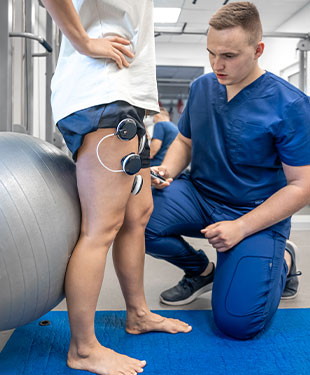Musculoskeletal Physiotherapy in Edmonton
Musculoskeletal conditions affect the muscles, bones, joints, tendons, and ligaments, leading to pain, discomfort, and mobility issues. These conditions can result from physical injury, repetitive movements, overuse, or degenerative changes. While some musculoskeletal issues are caused by specific events like trauma or injury, others can develop over time without a clear cause, often linked to daily habits and activities.
It is common to experience mild aches and pains after physical activity or an injury. Most of the time, these minor discomforts can be managed with rest or over-the-counter pain relief. However, when the pain becomes chronic and persists despite treatment, it can significantly impact your quality of life and limit your ability to perform everyday activities.
While musculoskeletal pain can result from direct physical injuries, it may also develop due to repetitive motions or poor posture. Additionally, some conditions may worsen over time, even without obvious causes.
Typical Signs of Musculoskeletal Conditions:
- Pain or discomfort in the muscles, joints, or bones
- Reduced range of motion or stiffness in joints
- Swelling or tenderness in the affected area
- Difficulty performing daily tasks
- Weakness or fatigue in the muscles
- Chronic pain or discomfort
- Decreased flexibility
Musculoskeletal Physiotherapy can help alleviate pain, restore mobility, and enhance the overall physical function of individuals suffering from musculoskeletal conditions. It is essential to consult a physiotherapist skilled in treating musculoskeletal disorders to ensure a treatment plan that aligns with your needs.
How Physiotherapy Helps with Musculoskeletal Conditions
Exercise for Strength and Flexibility
Musculoskeletal conditions often lead to muscle weakness and joint stiffness. Physiotherapists can create an exercise program focused on strengthening muscles and increasing flexibility, which helps reduce pain and improve movement.
Joint Mobilization and Stretching
Stiffness in the joints is a common issue with musculoskeletal conditions. A physiotherapist can guide you through stretching exercises and joint mobilization techniques to improve mobility and reduce discomfort.
Strength Training
Weak muscles contribute to pain and fatigue. A targeted strength training program designed by a physiotherapist can help build muscle strength and support the affected areas, reducing the strain on the joints.
Manual Therapy
Manual techniques such as massage, joint mobilizations, and myofascial release can help alleviate pain and improve circulation, promoting healing and restoring joint function.
Pain Management Techniques
Physiotherapists use modalities like transcutaneous electrical nerve stimulation (TENS), heat or cold therapy, or ultrasound to help manage pain and reduce inflammation.
Education
A key component of musculoskeletal physiotherapy is educating patients on proper body mechanics, posture, and movement patterns. Physiotherapists also help patients manage stress and provide techniques to prevent future injuries.
Why Choose Physiotherapy for Musculoskeletal Conditions?
When addressing musculoskeletal conditions, physiotherapy is an important part of a comprehensive approach. Physiotherapy can help individuals with musculoskeletal conditions in Edmonton regain mobility, reduce pain, and improve their overall quality of life by treating the physical symptoms and teaching valuable self-management skills.
Make an appointment with Creekwood Physiotherapy today to learn how our team can help you regain your strength and move towards a pain-free lifestyle.















